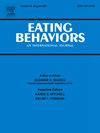Unhealthy app use and dietary restraint among young adults: The moderating role of body appreciation
IF 2.4
3区 医学
Q2 PSYCHIATRY
引用次数: 0
Abstract
Objective
Health and fitness apps that integrate wearable-device data have increased in popularity for self-monitoring of body appearance and weight goals. However, limited research has explored their potential to promote unhealthy eating behaviors. This study assessed body appreciation as a moderator of the relationship between health and fitness app use and dietary restraint.
Methods
A total of 126 young adults ( = 20.8 2.2 years, 65.9 % women) completed an online survey incorporating the Three-Factor Eating Questionnaire (TFEQ), Body Appreciation Scale (BAS) and frequency of app usage.
Results
Hierarchical regression analysis revealed that app use significantly and positively predicted dietary restraint, explaining 33.2 % of the variance (= 0.33, p < .001), with a combined large effect ( = 0.50). Body appreciation moderated this relationship, accounting for an additional 3.2 % of the variance (p = .018). Further analysis indicated for individuals with higher levels of body appreciation (above 2.95; 70.6 % of the sample), app use was significantly associated with dietary restraint.
Conclusions
Results indicate that dietary restraint was associated with one-third of young adults who use health and fitness apps. Unexpectedly, young adults with high body appreciation who actively engage with these apps report intentions to restrict food intake. It remains unclear whether app-related goal-setting features influence caloric restriction. Incorporating health warnings in apps and personalizing app interactions to discourage extreme goal setting may help protect those individuals at risk of developing eating disorders.
年轻人不健康的应用程序使用和饮食限制:身体欣赏的调节作用
集成可穿戴设备数据的健康和健身应用程序越来越受欢迎,可以自我监测身体外观和体重目标。然而,有限的研究已经探索了它们促进不健康饮食行为的潜力。这项研究评估了身体欣赏作为健康和健身应用程序使用与饮食限制之间关系的调节因素。方法对126名年轻成人(年龄为20.8±2.2岁,女性占65.9%)进行三因素饮食问卷(TFEQ)、身体欣赏量表(BAS)和应用程序使用频率的在线调查。结果层次回归分析显示,应用程序使用显著正向预测饮食限制,解释了33.2%的方差(R2= 0.33, p <;.001),综合效应较大(f2 = 0.50)。身体欣赏调节了这一关系,占方差的3.2% (p = 0.018)。进一步分析表明,对于身体欣赏水平较高的个体(高于2.95;70.6%的样本),应用程序的使用与饮食限制显著相关。研究结果表明,三分之一的年轻人使用健康和健身应用程序与饮食限制有关。出乎意料的是,积极使用这些应用程序的对身体有高度欣赏的年轻人表示,他们有意限制食物摄入。目前尚不清楚与应用程序相关的目标设定功能是否会影响热量限制。在应用程序中加入健康警告,并个性化应用程序交互,以阻止极端的目标设定,可能有助于保护那些有患饮食失调风险的人。
本文章由计算机程序翻译,如有差异,请以英文原文为准。
求助全文
约1分钟内获得全文
求助全文
来源期刊

Eating behaviors
Multiple-
CiteScore
4.20
自引率
3.60%
发文量
65
审稿时长
60 days
期刊介绍:
Eating Behaviors is an international peer-reviewed scientific journal publishing human research on the etiology, prevention, and treatment of obesity, binge eating, and eating disorders in adults and children. Studies related to the promotion of healthy eating patterns to treat or prevent medical conditions (e.g., hypertension, diabetes mellitus, cancer) are also acceptable. Two types of manuscripts are encouraged: (1) Descriptive studies establishing functional relationships between eating behaviors and social, cognitive, environmental, attitudinal, emotional or biochemical factors; (2) Clinical outcome research evaluating the efficacy of prevention or treatment protocols.
 求助内容:
求助内容: 应助结果提醒方式:
应助结果提醒方式:


